Student Well-Being

Internet Safety
Many families express concerns about keeping their children safe online. Tyndale takes child online safety very seriously and this topic is reinforced across the School. The South Australian Police and the eSafety Commission have several recommendations they make available to parents. Here are just some of them - it may be useful for parents to go through these with your children.
- Students should never share their passwords with friends or anyone except their parents.
- What does your digital shadow say about you? Remember that your shadow follows you around – as soon as you press send you send photos and messages for all the world to see.
- Keep your social media accounts on the private settings
- Delete any photos online that give out too much information
- Avoid sharing photos which are geotagged
- Avoid ‘checking in’ online when you go out
- Take care to avoid phone scams and never assume sites are safe
- Manage your time online carefully – lack of sleep due to not managing your phone well at night can lead to anxiety and depression in young people – parents can help with this.
- Maintain respectful relationships online
- If people online ask you for inappropriate images just say “NO!”
- Take care to avoid sharing personal sexual content – don’t allow someone else to have control of your images. It’s your body, don’t share it!
- Groomers can be anyone. If someone is asking questions you don’t like, tell a trusted adult. Report their behaviour to someone.
- Block. Report. Turn off the device.
- Gamers need to also take care – just because you think you know someone from gaming with them for several months online doesn’t mean you actually know them.
- Cyber bullying – speak to each other respectfully online, don’t send things in haste, don’t post things unless your parents would be ok with it.
If you would like further help to deal with online issues, this Australian website set up by the eSafety Commissioner has lots of advice, and tips for parents on helping your young person stay safe online.
https://www.esafety.gov.au/parents
We have recently also purchased a great book for parents by David Gillespie called “Teen Brain” – why screens are making your teenager depressed, anxious and prone to lifelong addictive illnesses – and how to stop it now.
This book is easy to read and contains lots of great advice on supporting young people in maintaining healthy online behaviour. If you would like to borrow the school's copy it is housed in the parent library in our main library at school.
Sue Chapman
Counsellor

